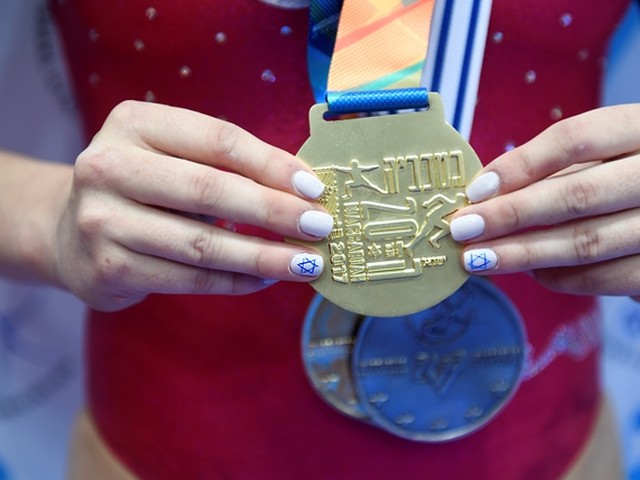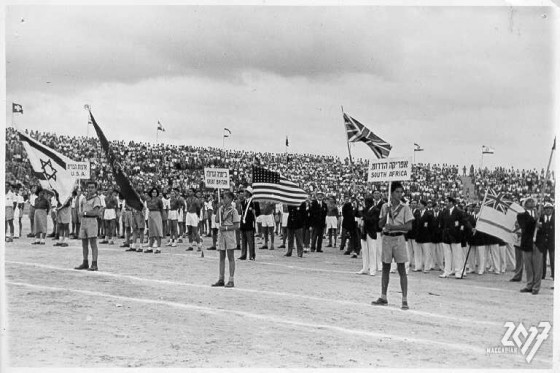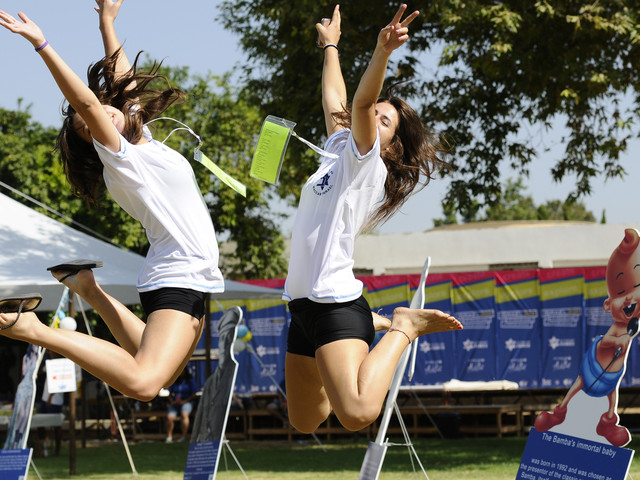The 21st Maccabiah Games –A Celebration of Sport in Israel
July 14-26, 2022
Despite peaking preparations, the 21st Maccabiah Games, originally scheduled for 2021, were postponed to summer 2022 due to the global coronavirus pandemic.
Nonetheless, it was the largest Maccabiah ever, with over 10,000 athletes from 70 countries competing across 42 sports. Maccabi USA, Maccabi Argentina, and Maccabi Australia followed the largest Israeli delegation. The smaller yet surprising delegations included Japan, Zimbabwe, the Cayman Islands, and the Bahamas.
This Maccabiah was characterized by several groundbreaking firsts…
For the first time, US President Joe Biden attended the opening ceremony of the Maccabiah held at Teddy Stadium in Jerusalem with 30,000 participants. President Biden interacted closely with members of the American delegation, waving to the audience and exchanging smiles with Israeli President Isaac Herzog and Prime Minister Yair Lapid. He expressed his strong support for Israel, stating to the delegation: "I'm proud of you, and I'm here because I support Israel'.
For the first time, this Maccabiah hosted delegations representing immigrants and Maccabi Europe.
For the first time, in this Maccabiah, we increased the number of participating teams in various sports, such as ice hockey, by forming teams with representatives from multiple countries.
For the first time, we introduced the Maccabiah Beach, a venue featuring beach sports, music, live performances, and culinary delights worldwide. This venue was open to the Israeli public and hosted the Maccabiah competitions in coastal sports.
For the first time, a ninja competition was featured at the Maccabiah Beach, showcasing Israeli Ninja Stars.
For the first time in Israel and at the Maccabiah, a spectacular motocross race took place at the Wingate Institute, featuring top riders from Israel, including children, and leading riders worldwide.
For the first time in Israel and at the Maccabiah, an extreme Super Indoro urban race was held. This two-wheeled motorsport event utilized existing natural urban routes, providing an enjoyable and spectator-friendly viewing experience. Approximately 150 riders from Israel and worldwide competed, offering the audience a unique sports experience unseen in Israel.
For the first time, we showcased cutting-edge sports technologies at the national velodrome, facilitating direct engagement with Israel's sports tech community. Israeli startups and ventures presented groundbreaking developments in sports medicine, performance enhancement, broadcasting and media, statistics, fan engagement, and merchandise.
For the first time in years, the Israeli audience was exceptionally engaged, present, and active in this Maccabiah. The sports facilities were filled with enthusiastic crowds from Israel and around the world.
For the first time in years, this Maccabiah introduced a new anthem titled 'Carnival,' performed by Israeli pop stars Static and Ben El. The accompanying music video brought together Israeli Olympic and Paralympic medalists alongside prominent athletes from Israeli sports.
For the first time, a special photo exhibition titled 'Israel Celebrates Sports' was showcased at Ben Gurion Airport. The exhibition on the boulevard leading to the departure hall highlighted Jewish athletes with remarkable stories from the history of the Maccabiah Games.
The two standout athletes of this Maccabiah were Anastasia Gorbenko, a world champion swimmer and Olympic finalist, who set a new Maccabiah record in the 200-meter mixed individual medley with a time of 2:14:25, and Denis Petrashov, an Olympic swimmer from Kyrgyzstan, who won the 100-meter breaststroke in 1:00.46 minutes, also setting a new Maccabiah record.
At the vibrant opening ceremony of the Maccabiah, held at Teddy Stadium in Jerusalem with 30,000 spectators, 10,000 athletes from 70 countries marched in a dazzling display. Acclaimed Israeli artists, including Eden Ben Zaken, Tamir Greenberg, Hanan Ben Ari, and Static and Ben El, filled the stadium with music, further elevating the atmosphere.
Olympic champions Artem Dolgopyat and Linoy Ashram lit the Maccabiah torch, joined by five other distinguished athletes: Olympic Taekwondo medalist Avishag Semberg, European swimming champion Anastasia Gorbenko, Paralympic swimming champions Ami Dadaon and Lyad Shalabi, and Jewish-American baseball player Ian Kinsler.
The closing ceremony of the 21st Maccabiah brought together athletes for a night of celebration at the Live Park Rishon LeZion complex. Hosted by Miri Nevo and Almaz Mengistu, the ceremony featured famous Israeli artists like Noa Kirel and Netta Barzilai, alongside captivating performances from Nono, Stephane Legar, Hatikva 6, Eden Darso, and Daniel Arison, leaving a lasting impression on the audience.
The 21st Maccabiah Chairman was Arik Zeevi, Olympic judoka.




